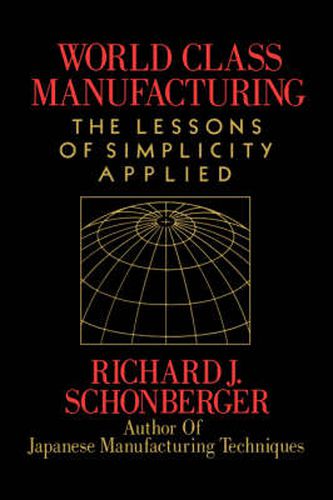Readings Newsletter
Become a Readings Member to make your shopping experience even easier.
Sign in or sign up for free!
You’re not far away from qualifying for FREE standard shipping within Australia
You’ve qualified for FREE standard shipping within Australia
The cart is loading…






In his best-selling book Japanese Manufacturing Techniques, Richard J. Schonberger revolutionized American manufacturing theory and, more important, practice. In that breakthrough book, he revealed that Japanese manufacturing excellence was not culturally bound. Offering the first demystified explanation of the simple techniques that fueled Japan’s industrial success, he demonstrated how the same methods could be put to work as effectively in U.S. plants. Now, in World Class Manufacturing, Schonberger returns to tell the success stories of nearly 100 American corporations – including Hewlett-Packard, Harley-Davidson, General Motors, Honeywell, and Uniroyal – that have adopted the famed just-in-time production and total quality control strategies. Based on his firsthand experience as a major consultant to American industry, he examines how they did it – and illustrates how the same concrete, specific steps used by these top companies can be implemented in any factory today. What’s more, Schonberger shows that his bold concepts and reforms apply equally to all industries, whether the product is computers, pasta, or trucks, and to all divisions – from manufacturing and engineering to accounting and marketing.
According to Schonberger, world-class manufacturing depends on blended management – rather than domination by a separate group of managers – which marshalls resources for continual rapid improvement. To achieve world-class status, companies must change procedures and concepts, which in turn leads to recasting relations among suppliers, purchasers, producers, and customers. Acknowledging the difficulty inherent in such changes, Schonberger stresses that employee involvement and interaction, both on the shop floor and in the decision-making/problem-solving process, is key. Wary of those who view improvement in terms of modernizing equipment, he points out that making maximum use of people and current machinery is a company’s first priority; automation, if necessary, should come much later.
World Class Manufacturing also includes Schonberger’s 17-point action agenda to guide innovators toward manufacturing excellence, from getting to know the customer to cutting the number of suppliers, reducing error in production, and deciding when and how to automate.
Indispensable for all manufacturing innovators who aim to keep ahead of the competition, this inspiring, groundbreaking volume does much more than just recommend or theorize about the new manufacturing approach. Plainly, realistically, and logically, it explains how it’s done.
$9.00 standard shipping within Australia
FREE standard shipping within Australia for orders over $100.00
Express & International shipping calculated at checkout
In his best-selling book Japanese Manufacturing Techniques, Richard J. Schonberger revolutionized American manufacturing theory and, more important, practice. In that breakthrough book, he revealed that Japanese manufacturing excellence was not culturally bound. Offering the first demystified explanation of the simple techniques that fueled Japan’s industrial success, he demonstrated how the same methods could be put to work as effectively in U.S. plants. Now, in World Class Manufacturing, Schonberger returns to tell the success stories of nearly 100 American corporations – including Hewlett-Packard, Harley-Davidson, General Motors, Honeywell, and Uniroyal – that have adopted the famed just-in-time production and total quality control strategies. Based on his firsthand experience as a major consultant to American industry, he examines how they did it – and illustrates how the same concrete, specific steps used by these top companies can be implemented in any factory today. What’s more, Schonberger shows that his bold concepts and reforms apply equally to all industries, whether the product is computers, pasta, or trucks, and to all divisions – from manufacturing and engineering to accounting and marketing.
According to Schonberger, world-class manufacturing depends on blended management – rather than domination by a separate group of managers – which marshalls resources for continual rapid improvement. To achieve world-class status, companies must change procedures and concepts, which in turn leads to recasting relations among suppliers, purchasers, producers, and customers. Acknowledging the difficulty inherent in such changes, Schonberger stresses that employee involvement and interaction, both on the shop floor and in the decision-making/problem-solving process, is key. Wary of those who view improvement in terms of modernizing equipment, he points out that making maximum use of people and current machinery is a company’s first priority; automation, if necessary, should come much later.
World Class Manufacturing also includes Schonberger’s 17-point action agenda to guide innovators toward manufacturing excellence, from getting to know the customer to cutting the number of suppliers, reducing error in production, and deciding when and how to automate.
Indispensable for all manufacturing innovators who aim to keep ahead of the competition, this inspiring, groundbreaking volume does much more than just recommend or theorize about the new manufacturing approach. Plainly, realistically, and logically, it explains how it’s done.